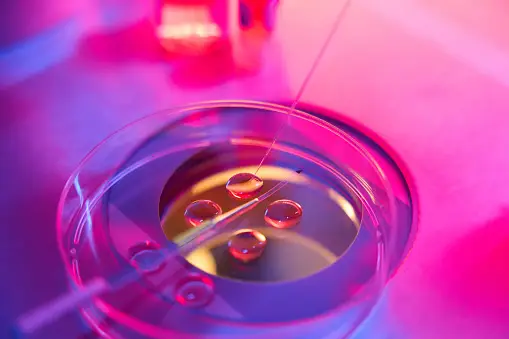As women age, their reproductive health declines gradually. Today, getting pregnant is a significant challenge for some couples in Nigeria. While there are popular procedures like IVF and surrogacy, the success rate is unpredictable.
Egg freezing is a preventive process that allows a woman to freeze her eggs and subsequently use these eggs at a relative time.
What is egg freezing?
Egg freezing is a medical procedure that involves extracting, freezing, and storing a woman's mature eggs. The eggs are thawed and fertilised in a laboratory when the woman wishes to get pregnant. The embryo is then transferred to the woman's uterus, resulting in a pregnancy. Egg freezing benefits women struggling with fertility problems and other terminal health issues.
Benefits of egg freezing
There are many benefits to freezing mature eggs. Some of them include;
- Terminal diseases and other medical conditions: Medical conditions like cancer, cardiovascular diseases, and endometriosis can all pose a risk to sterility during treatment. It is safe to carry out egg freezing before treatment to protect the eggs from exposure to harmful substances and prevent infertility.
- Improves egg quality: Since egg quantity and quality diminish as women age, egg freezing preserves the quality of mature eggs for future conception. By age 35, in some women, half of their eggs are abnormal; by the time they are 40, only a quarter of these eggs may produce a child. Egg freezing at a younger age allows women to preserve the quality of eggs.
- Reduces biological clock pressure: In Nigeria, the pressure on women to conceive is alarming. The case is worse in women older than 35. Women can conceive at their convenience without fear of pressure by egg freezing at a young age.
- Egg supply: Egg supply is limited in women. During development in the womb, females have about 6 million eggs. At birth, only 1 million are present, and by puberty, 300,000 are left. Peak fertility is seen in the early 20s, declining till menopause. At age 40, the average pregnancy rate is 5%. Egg freezing allows women to store many healthy and mature eggs for later conception.
- Empowering reproductive health choices: Women can consciously make decisions around their reproductive health with egg freezing. It allows women to plan their pregnancies and also helps facilitate infertility treatment without fear of egg damage.
When is the best time to freeze my eggs as a Nigerian woman?
Peak fertility happens in your early 20s, and it is recommended to freeze your eggs in your early 20s for a higher chance of pregnancy. However, egg freezing between ages 30 to 35 is still safe and advised.
Can I get pregnant naturally after egg freezing?
Egg freezing doesn’t harm the remaining healthy and mature eggs in the uterus. It won’t affect your chances of a natural pregnancy. Egg freezing is a backup plan to prevent infertility-related issues in a woman’s life.
Egg Freezing Vs IVF: Which is better for conception?
Both procedures are adequate for assisted conception. However, experts advise egg freezing at a young age because it is cost-effective and prolongs a better chance of conception than IVF. IVF at an advanced age is more expensive due to multiple trials before pregnancy.
How many eggs should I freeze?
This depends on the age and overall health of the woman.
- Women under age 25 can freeze 30 mature eggs.
- Women between 30 and 35 can freeze 10 to 20 eggs.
- Women between 35 and 42 can freeze 10 to 15 eggs.
However, the case may differ for women with a low ovarian reserve (low egg supply). A reproductive endocrinologist will help guide you in this process.
What is the success rate for egg freezing?
Women under 35 years of age have an 85% chance of pregnancy. Women above 35 to 40 have a 75% chance of pregnancy. Women between 40 and 45 have a 50% chance of pregnancy.
Factors that affect egg freezing
Like any other assisted conception, several factors may affect this procedure. While egg freezing has a high success rate, some factors may disrupt a successful pregnancy. They include;
- Age of the woman: Younger women in their 20s tend to have more healthy and quality eggs free from anomalies. Older women have fewer eggs, which may consist of abnormal eggs lacking quality.
- Health of the sperm: After thawing the eggs for fertilisation, the state of the sperm matters. A healthy sperm produces a healthy embryo and a successful pregnancy.
- Choice of facility: The success rates for egg thawing and fertilisation differ for every fertility clinic. At least a 75% success rate is adequate for a good fertility clinic. Ensure to carry out research and ask relevant questions.
- Number of eggs: Freezing many eggs has a higher chance of pregnancy than freezing smaller eggs.
Are there any side effects of egg freezing?
Like any other medical procedure, there are a few mild side effects. Common ones include;
- Headache
- Mood swings
- Bloating
Egg freezing is a great way to secure your reproductive health cost-effectively. Egg freezing allows women to successfully carry pregnancies at any age while protecting and enriching their reproductive health. This procedure is safe and has a high pregnancy success rate, depending on various factors. Ensure to carry out in-depth research of a facility before making a decision.
To list your service on Babymigo, partner with us or leverage our advertising options, email [email protected]. Subscribe to our weekly business newsletter to gain a variety of strategic insights on growing and developing your brand.










Comments